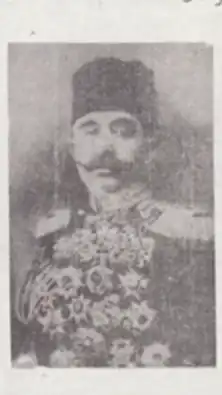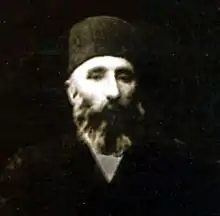The Kurdish Society for Cooperation and Progress "Kürt Teavün ve Terakki Cemiyeti"[1] (KTTC) was founded September 1908 in Constantinople .[2][3] Also known as the Kurdish Society for Progress and Mutual Aid,[4][5] Kurdish Society for Mutual Aid and Progress,[6] Kurdish Society for Support and Progress,[7] Kurdish Society for Assistance and Progress,[8] Kurdish Society for Solidarity and Progress,[9] Kurdish Progressive League,[10] Kurdish League,[11] Kurdish Club[12] and Kurdish Society.[13] The society published a Gazette,[14] which was the first legal Kurdish publication, it debated issues surrounding history, language, national unity and many other topics effecting Kurds.[15] It was the first ever political Kurdish organization and was influenced by European ideas.[16][17] It called for a political, economic and social awakening of Kurdistan.[18] The announcement of its establishment[19] was made in September 1908 and backed by 500 leading Kurdish intellectuals and statesmen.[20] The membership of the society grew very fast in cities and towns with large Kurdish populations.[21] The society had a cultural branch, which established a Kurdish language school for children[22] in Çemberlitas, Constantinople, led by Abdurrahman Bedir Khan.[23] It was closed down in 1909 and reestablished and renamed in 1917 as the Society for the Elevation of Kurdistan.[24][25]
The founding members were;



References
- ↑ Bocheńska, Joanna (2018). Rediscovering Kurdistan’s Cultures and Identities: The Call of the Cricket. Springer. p. 109. ISBN 3319930885.
- ↑ Klein, Janet (2011). The Margins of Empire: Kurdish Militias in the Ottoman Tribal Zone. California: Stanford University Press. p. 113. ISBN 0804775702.
- ↑ Maisel, Sebastian (2018). The Kurds: An Encyclopedia of Life, Culture, and Society. ABC-CLIO. p. 167. ISBN 1440842574.
- ↑ Heper, Metin (2007). The state and Kurds in Turkey: the question of assimilation. Palgrave Macmillan. p. 54. ISBN 0333646282.
- ↑ Olson, Robert W. (2008). Imperial Meanderings and Republican By-Ways: Essays on Eighteenth Century Ottoman and Twentieth Century History of Turkey. University of Michigan. p. 136. ISBN 9754280975.
- ↑ Bruinessen, Martin van (1992). Agha, shaikh, and state: the social and political structures of Kurdistan. University of Michigan. p. 275. ISBN 1856490181.
- ↑ Zürcher, Erik J. (1997). Turkey: A Modern History. Bloomsbury Academic. p. 177. ISBN 1860642225.
- ↑ Üngör, Uǧur Ümit (2009). Young Turk Social Engineering: Mass Violence and the Nation State in Eastern Turkey, 1913-1950. University of Amsterdam. p. 91.
- 1 2 3 4 Kaya, Zeynep N. (2020). Mapping Kurdistan: Territory, Self-Determination and Nationalism. Cambridge University Press. p. 68. ISBN 1108601685.
- ↑ Bedr Kahn, Sureya (1995). The Case of Kurdistan Against Turkey. Sara. p. 19.
- ↑ Lacy Rush & Priestland, Alan & Jane (2001). Records of Iraq, 1914-1966: 1921-1924, Volume 3 of Records of Iraq, 1914-1966. Archive Editions. p. 537. ISBN 1852078200.
- ↑ O'Ballance, E. (1995). The Kurdish Struggle, 1920-94. Springer. p. 9. ISBN 0230377424.
- ↑ Manafy, A. (2005). The Kurdish Political Struggles in Iran, Iraq, and Turkey: A Critical Analysis. University Press of America. p. 53. ISBN 0761830030.
- ↑ Chaliand & Ghassemlou, Gérard & Abdul Rahman (1993). A People without a country: the Kurds and Kurdistan. Michigan: University of Michigan. p. 27. ISBN 1856491935.
- ↑ Chaliand, Gérard (1993). A People Without a Country: The Kurds and Kurdistan. Zed Books. p. 27. ISBN 1856491943.
- ↑ Boris & Gorgas, Boris & Jordi Tejel. Les Kurdes en 100 questions. Tallandier. p. 11. ISBN 9791021033818.
- ↑ Soheil, Adel (2018). Territory, State and Nationalism: Anglo-Iraqi Policy Toward the Kurdish National Movement, 1918-1932. BoD - Books on Demand. p. 83. ISBN 9177855132.
- ↑ Oriente moderno, Volume 25. Istituto per l'oriente. 2006. p. 464.
- ↑ Garabato, M. Carmen Alén (2005). L'éveil des nationalités et les revendications linguistiques en Europe (1830-1930). L'Harmattan. p. 257. ISBN 2296000525.
- ↑ Bilgin & Sarihan, Fevzi & Ali (2013). Understanding Turkey's Kurdish Question. Lexington Books. p. 20. ISBN 0739184032.
- ↑ Ahmed & Gunter, Mohammed M. A. & Michael M. (2007). The Evolution of Kurdish Nationalism. Mazda Publishers. p. 40. ISBN 1568591942.
- ↑ White, Paul J. (2000). Primitive Rebels Or Revolutionary Modernisers?: The Kurdish Nationalist Movement in Turkey. Zed Books. pp. 65, 66. ISBN 1856498212.
- ↑ Behrendt, Günter (1993). Nationalismus in Kurdistan: Vorgeschichte, Entstehungsbedingungen und erste Manifestationen bis 1925 (in German). Deutsches Orient-Institut. p. 270. ISBN 3-89173-029-2.
- ↑ Hassanpour, Amir (1992). Nationalism and language in Kurdistan, 1918-1985. Mellen Research University Press. p. 61. ISBN 0773498168.
- ↑ Rostami, Mari R. (2019). Kurdish Nationalism on Stage: Performance, Politics and Resistance in Iraq. Bloomsbury Publishing. p. 53. ISBN 1788318706.